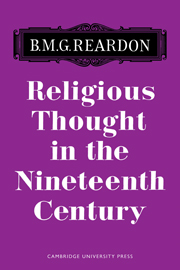Book contents
- Frontmatter
- Preface
- Contents
- Introduction
- PART I EUROPEAN
- PART II BRITISH AND AMERICAN
- 1 Coleridge
- 2 F. D. Maurice
- 3 Newman
- 4 Mansel
- 5 J. S.Mill
- 6 Benjamin Jowett and Essays and Reviews
- 7 Matthew Arnold
- 8 Scott Holland and Lux Mundi
- 9 The British Hegelians
- 10 Emerson
- 11 Josiah Royce
- 12 William James
- Index of Works Cited
- Frontmatter
- Preface
- Contents
- Introduction
- PART I EUROPEAN
- PART II BRITISH AND AMERICAN
- 1 Coleridge
- 2 F. D. Maurice
- 3 Newman
- 4 Mansel
- 5 J. S.Mill
- 6 Benjamin Jowett and Essays and Reviews
- 7 Matthew Arnold
- 8 Scott Holland and Lux Mundi
- 9 The British Hegelians
- 10 Emerson
- 11 Josiah Royce
- 12 William James
- Index of Works Cited
Summary
John Stuart Mill, philosopher and economist, and eldest son of James Mill, was born in London in 1806. Details of his early education, conducted by his father on rigorously doctrinaire lines, are familiar from his Autobiography. He started Greek at the age of 3, Latin at 7, and by the time he was 12, with a considerable first-hand knowledge of the classical authors already at his disposal, he had embarked, with Aristotle's Logic, on the study of philosophy. And much else had also to be mastered—mathematics as far as the differential calculus, natural science, history. At 14 came Ricardo's Political Economy. ‘Anything’, Mill wrote, ‘which could be found out by thinking I was never told, until I had exhausted my efforts to find it out for myself.’ A year in France provided further intellectual stimulus, but the climax was reached with the works of Jeremy Bentham. ‘I now’, he records, ‘had opinions, a creed, a doctrine, a philosophy; in one among the best senses of the word, a religion; the inculcation and diffusion of which could be made the principal outward purpose of my life.’ At the age of 17 he was appointed to a clerkship in the office of the East India Company's examiner of India correspondence, and here he remained for the ensuing thirty-five years, retiring, as head of his department, when the company's governmental powers were transferred to the Crown. His spare time, however, had been given to literary work.
- Type
- Chapter
- Information
- Religious Thought in the Nineteenth Century , pp. 297 - 308Publisher: Cambridge University PressPrint publication year: 1966

